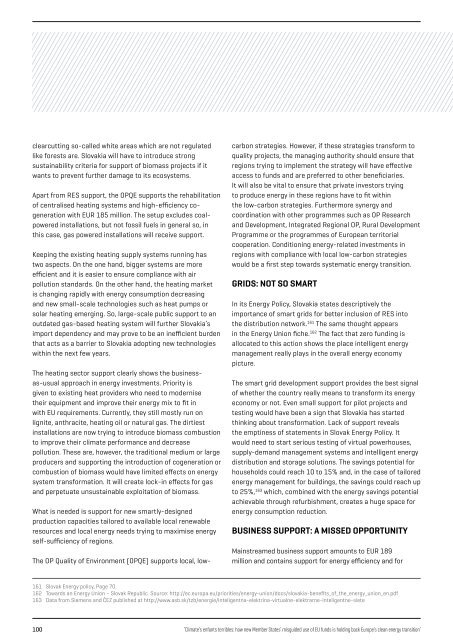ENFANTS TERRIBLES
enfants-terribles
enfants-terribles
Create successful ePaper yourself
Turn your PDF publications into a flip-book with our unique Google optimized e-Paper software.
clearcutting so-called white areas which are not regulated<br />
like forests are. Slovakia will have to introduce strong<br />
sustainability criteria for support of biomass projects if it<br />
wants to prevent further damage to its ecosystems.<br />
Apart from RES support, the OPQE supports the rehabilitation<br />
of centralised heating systems and high-efficiency cogeneration<br />
with EUR 185 million. The setup excludes coalpowered<br />
installations, but not fossil fuels in general so, in<br />
this case, gas powered installations will receive support.<br />
Keeping the existing heating supply systems running has<br />
two aspects. On the one hand, bigger systems are more<br />
efficient and it is easier to ensure compliance with air<br />
pollution standards. On the other hand, the heating market<br />
is changing rapidly with energy consumption decreasing<br />
and new small-scale technologies such as heat pumps or<br />
solar heating emerging. So, large-scale public support to an<br />
outdated gas-based heating system will further Slovakia’s<br />
import dependency and may prove to be an inefficient burden<br />
that acts as a barrier to Slovakia adopting new technologies<br />
within the next few years.<br />
The heating sector support clearly shows the businessas-usual<br />
approach in energy investments. Priority is<br />
given to existing heat providers who need to modernise<br />
their equipment and improve their energy mix to fit in<br />
with EU requirements. Currently, they still mostly run on<br />
lignite, anthracite, heating oil or natural gas. The dirtiest<br />
installations are now trying to introduce biomass combustion<br />
to improve their climate performance and decrease<br />
pollution. These are, however, the traditional medium or large<br />
producers and supporting the introduction of cogeneration or<br />
combustion of biomass would have limited effects on energy<br />
system transformation. It will create lock-in effects for gas<br />
and perpetuate unsustainable exploitation of biomass.<br />
What is needed is support for new smartly-designed<br />
production capacities tailored to available local renewable<br />
resources and local energy needs trying to maximise energy<br />
self-sufficiency of regions.<br />
The OP Quality of Environment (OPQE) supports local, lowcarbon<br />
strategies. However, if these strategies transform to<br />
quality projects, the managing authority should ensure that<br />
regions trying to implement the strategy will have effective<br />
access to funds and are preferred to other beneficiaries.<br />
It will also be vital to ensure that private investors trying<br />
to produce energy in these regions have to fit within<br />
the low-carbon strategies. Furthermore synergy and<br />
coordination with other programmes such as OP Research<br />
and Development, Integrated Regional OP, Rural Development<br />
Programme or the programmes of European territorial<br />
cooperation. Conditioning energy-related investments in<br />
regions with compliance with local low-carbon strategies<br />
would be a first step towards systematic energy transition.<br />
GRIDS: NOT SO SMART<br />
In its Energy Policy, Slovakia states descriptively the<br />
importance of smart grids for better inclusion of RES into<br />
the distribution network. 161 The same thought appears<br />
in the Energy Union fiche. 162 The fact that zero funding is<br />
allocated to this action shows the place intelligent energy<br />
management really plays in the overall energy economy<br />
picture.<br />
The smart grid development support provides the best signal<br />
of whether the country really means to transform its energy<br />
economy or not. Even small support for pilot projects and<br />
testing would have been a sign that Slovakia has started<br />
thinking about transformation. Lack of support reveals<br />
the emptiness of statements in Slovak Energy Policy. It<br />
would need to start serious testing of virtual powerhouses,<br />
supply-demand management systems and intelligent energy<br />
distribution and storage solutions. The savings potential for<br />
households could reach 10 to 15% and, in the case of tailored<br />
energy management for buildings, the savings could reach up<br />
to 25%, 163 which, combined with the energy savings potential<br />
achievable through refurbishment, creates a huge space for<br />
energy consumption reduction.<br />
BUSINESS SUPPORT: A MISSED OPPORTUNITY<br />
Mainstreamed business support amounts to EUR 189<br />
million and contains support for energy efficiency and for<br />
161<br />
162<br />
163<br />
Slovak Energy policy, Page 70.<br />
Towards an Energy Union – Slovak Republic. Source: http://ec.europa.eu/priorities/energy-union/docs/slovakia-benefits_of_the_energy_union_en.pdf<br />
Data from Siemens and ČEZ published at http://www.asb.sk/tzb/energie/inteligentna-elektrina-virtualne-elektrarne-inteligentne-siete<br />
100<br />
‘Climate’s enfants terribles: how new Member States’ misguided use of EU funds is holding back Europe’s clean energy transition’


